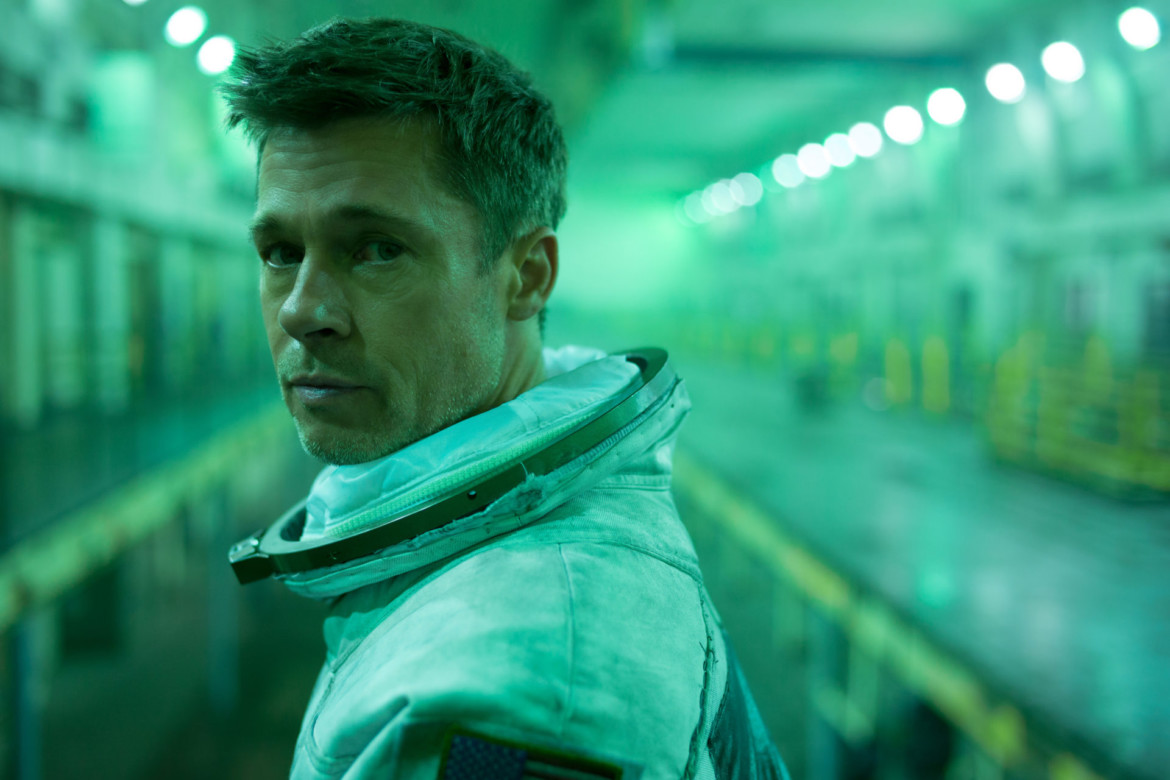In “Ad Astra,” a stunning space epic thrusting Brad Pitt to the edge of our solar system, the deadliest vacuum is toxic masculinity
By Cristina Schreil
Do we need another space movie? This is what many reviewers of “Ad Astra,” a sleek galactic drama by director and co-writer James Gray, coincidentally pondered. Indeed, in the film, which stars Brad Pitt as Maj. Roy McBride, an intrepid yet detached astronaut in the near future, déjà vu underpins several passages. There’s a suspenseful-turned haunting scene ripped from the same cloth as “Alien.” Disorienting spacewalks recall “Gravity.” The moon feels uncannily like the bloated capitalism from “The Fifth Element.” And, “2001: A Space Odyssey” resonates throughout.
Like the best of the genre, “Ad Astra” harnesses the metaphor of harrowing deep-space exploration to comment on more complicated journeys inward. Pitt’s character confronts more inner demons the farther he travels. Pitt’s acting and Gray’s equal focus on emotional beats and riveting action cements this concept. This is not a rollicking sci-fi romp. It’s overwhelmingly dreary and sallow, save for some beautiful cosmic footage. Humanity’s flaws dominate. It’s enthralling as a result.
The plot’s premise is an intriguing quest: Earth faces destructive energy blasts, a crippling phenomenon called “The Surge.” An opening scene, also establishing McBride’s legendary penchant for keeping cool under pressure, shows this surge ravaging a colossal International Space Station. Higher-ups at the shadowy corporation SpaceCom inform McBride that he must confront the enemy—who happens to be his long-lost father. The elder McBride, played with chilling frankness by Tommy Lee Jones, disappeared years prior. He’s secretly alive, sequestering near Neptune, the planet of disillusionment and fantasy. He’s seeking alien life—potentially a tongue-in-cheek nod to his previous “Men in Black” role.
Pitt’s performance elevates the film to a greater meditation on human existence. He makes insightful micro-choices. His character is a top-notch astronaut primarily because he can halt emotion. To excel, he disconnects from himself, resonating like his human-masquerading character in “Meet Joe Black.” His regular psychological evaluations via robotic therapist—Siri in shrink form—feel contrived. It’s a SpaceCom requirement; heart-rate spikes are unacceptable. Later, when Pitt becomes overemotional, he’s quarantined to “comfort rooms,” with corny projected images of nature, to control himself. When a space veteran and former family friend (played by Donald Sutherland) probes McBride’s tamped-down daddy issues, Pitt almost evokes a teenaged boy trying to keep from crying. It’s a fascinating performance. It’s also a portrait of toxic masculinity: emotions are the antithesis to success. He isolates to survive; his own feelings shame him.
Gray wanted to present the most realistic account of space travel. Space has gorgeous aspects — there’s phenomenal cinematography, complemented by a transporting soundtrack. But, the way humans have colonized it is cynically, ugly. Pirates ruin the moon. Life on Mars feels claustrophobic and sickly. It begs the question, “Why would anyone want to go?” Gray highlights how this terra incognita is entirely hostile to human life, but still, driven by hubris, man wants it.
“Ad Astra” means “to the stars” and the movie is indeed celebrity-studded. There’s Natasha Lyonne, a zany worker bee confined to a dingy Mars checkpoint. “Ad Astra” does not, as expected, pass the Bechdel Test. The two top-billed female stars, Liv Tyler and Ruth Negga, are only pawns to elucidate McBride’s inner conflict or drive the plot. Tyler, McBride’s wife, barely has lines, and many scenes feature her completely unfocused—only a literalization of her husband’s disconnect. Negga plays a sly Martian whose personal vendetta catapults McBride toward his final act.
That act turns out to be more philosophical than climactic. McBride does face his demons in a kind of toxic masculinity tango. A single, meme-able tear falls. This isn’t to say it’s two-plus hours of feelings. There are mesmerizing action scenes—McBride deftly navigates space like a Marvel character, a glossier MacGyver with cheekbones.
At the film’s start, McBride ponders about his father, “What did he find out there in the abyss?” What the audience finds with him is worth the journey.
“Ad Astra” is now playing in theaters.
